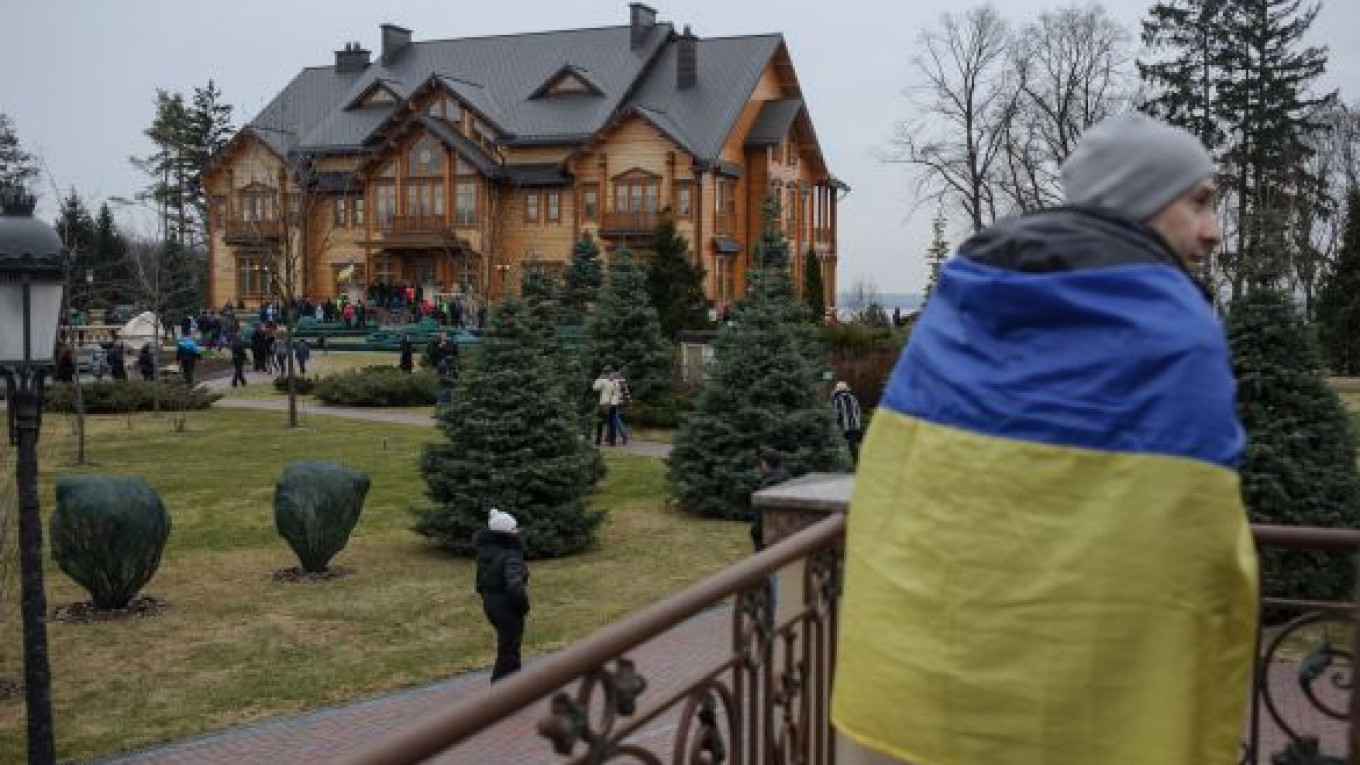KIEV — Cash: $12 million. Decoration of a dining hall and tea room: $2.3 million. Statue of a wild boar: $115,000. "A bribe": $4,000.
These are some of the expenses detailed in financial documents found in ousted Ukrainian leader Viktor Yanukovych's abandoned residence, which was occupied by protesters after the leader fled the capital.
As thousands of Ukrainians continued to tour Yanukovych's opulent estate outside of Kiev on Sunday, evidence was uncovered of lavish spending in an economy that is teetering on the verge of default.
Yanukovych left Kiev on Friday night after opposition protesters took control of the capital and the national parliament in the wake of deadly clashes with police last week. More than 70 people were killed and hundreds were injured.
While visitors gawked in awe and outrage at Yanukovych's luxurious mansions, ponds and exotic animals, journalists combed through heaps of documents that appeared to show a leader who basked in extravagant wealth while his country sought bailouts from both the West and Russia.
Many of the financial and other documents were burned, while others were dumped in a lake before Yanukovych fled his closely guarded residence, flying to the eastern city of Kharkiv, where his support base is strongest. Divers were able to retrieve many of the documents, and activists laid them out to dry.
Photos of the documents were posted online by Mustafa Nayem, a top Ukrainian investigative journalist for the Ukrainska Pravda website and Hromadske.tv online news channel. Other respected Ukrainian news outlets also reported on the documents.
One was a receipt for $12 million in cash. Another invoice was for a payment of $10 million. Some 80,000 euros ($110,000) went for curtains in a room called the "knight's hall." Another 1.1 million euros ($1.5 million) was spent on plants. Wooden decor for a handful of rooms cost $2.3 million.
Notably, $115,000 was spent for a statue of a "running boar," possibly intended for Yanukovych, who is an avid hunter.
One page listed expenditures, and next to item No. 47 on the sheet was a payment of 32,580 hryvna ($4,000) for what was described as a "bribe" used in a bidding process.
The documents were sure to fuel more anger among protesters.
Yanukovych's residence in Mezhyhirya Park, about 140 hectares of forested hills along the Dnieper River, had become for many Ukrainians a symbol of a corrupt administration. The president refused to answer questions about the estate, saying he lived in a modest house on a small plot of land on the grounds.
Journalists' investigations traced the property and buildings around it to Yanukovych's allies.
After Yanukovych's departure from Kiev, the estate was taken over by the opposition's self-defense units, which opened it to visitors and deployed activists to maintain order and prevent any looting or property damage. Ukrainians, many bringing their children, rushed to tour the parks. They reacted with wonder and revulsion at the opulence, including Yanukovych's private golf courses, pig farm and a small zoo with ostriches and peacocks.
Some have called for turning the site into a hospital, sanatorium or even a "museum of corruption."
The Verkhovna Rada — Ukraine's parliament that is now controlled by the opposition — voted Sunday to turn over control of the estate to the government.
A Message from The Moscow Times:
Dear readers,
We are facing unprecedented challenges. Russia's Prosecutor General's Office has designated The Moscow Times as an "undesirable" organization, criminalizing our work and putting our staff at risk of prosecution. This follows our earlier unjust labeling as a "foreign agent."
These actions are direct attempts to silence independent journalism in Russia. The authorities claim our work "discredits the decisions of the Russian leadership." We see things differently: we strive to provide accurate, unbiased reporting on Russia.
We, the journalists of The Moscow Times, refuse to be silenced. But to continue our work, we need your help.
Your support, no matter how small, makes a world of difference. If you can, please support us monthly starting from just $2. It's quick to set up, and every contribution makes a significant impact.
By supporting The Moscow Times, you're defending open, independent journalism in the face of repression. Thank you for standing with us.
Remind me later.






